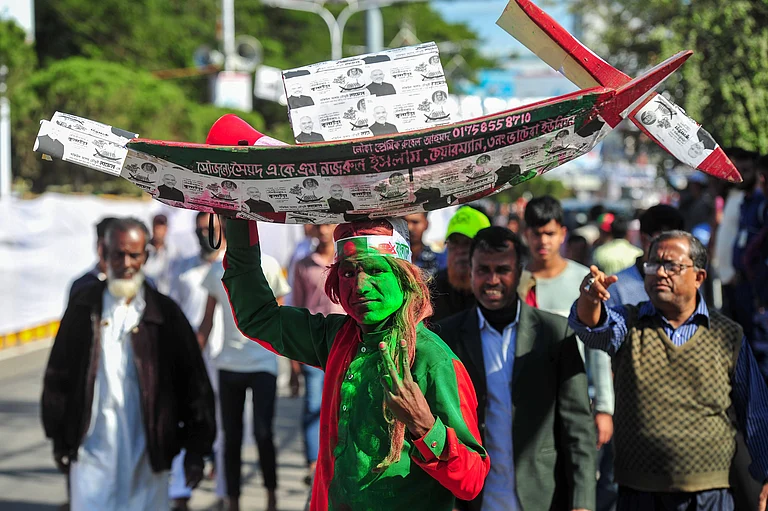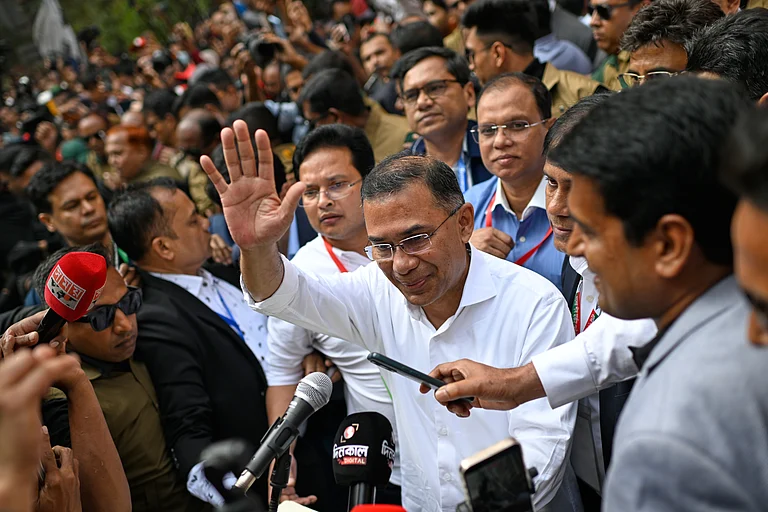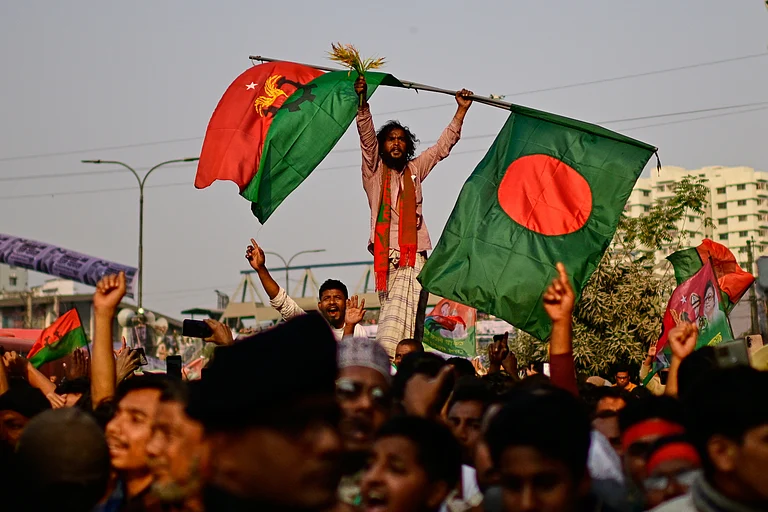Curtains have come down on Sheikh Hasina's tenure as the Prime Minister of neighbouring Bangladesh. On Monday, August 5, Hasina resigned as the PM and fled the country amid massive protests against her government that claimed around 100 lives over the last two days. More than 300 people have been killed in the country since the anti-quota demonstrations began last month.
As Hasina fled Bangladesh, Army Chief General Waqar-uz-Zaman said in a nationally televised address that an interim government was taking over and that the responsibility of law and order would remain with the Army.
Sheikh Hasina and her downfall
Sheikh Hasina, 76, is the daughter of Bangladesh founder Sheikh Mujibur Rahman. Hasina has been in power in the strategically important Indian neighbouring country since 2009. She won the Bangladesh General Election a fourth consecutive time just a few months ago this January. This was her fifth term overall as the PM of Bangladesh after being elected in 1996 for the first time.
Importantly, Hasina won the election earlier this year amid a boycott by the Bangladesh Nationalist Party, the main opposition party led by former PM Khaleda Zia, and its allies. Critics dubbed the election a 'sham'.
When sworn in as the prime minister in January, Hasina would not have imagined things going so wrong that in a few months, she would not just have to leave power but flee the country altogether. However, dramatic events over the past few weeks, especially over the last weekend, brought about Hasina's downfall.
As reports came in of Hasina leaving the presidential palace in Dhaka in a military helicopter, protesters stormed the building and are reported to have indulged in looting and arson there. Footage played on television showed protesters taking away chairs, sofas and other things from the 'Ganabhaban' residence. In shocking scenes, some of the protesters were also seen in video footage damaging the statue of Hasina's father Mujibur Rahman.
The protests first started in early July against the controversial reservation system under which nearly a third of jobs are reserved for the families of veterans who had participated in the 1971 Liberation War when Bangladesh gained independence from Pakistan with help from India.
Students took to the streets across the country demanding the abolition of the quota. Over 200 people were killed in the first wave of protests, mostly during violent clashes between police and protesters. Over 11,000 people have also been taken into custody since the protests first began.
While the Bangladesh Supreme Court recently scrapped the job quotas that led to the protests, the agitation did not end and transformed into an anti-government movement that called for Hasina to quit.
A defiant Hasina refused to step down and described the agitators as “terrorists” and supported suppressing them "with a firm hand".
However, the unprecedented violence on Sunday which saw at least 90 people, including 13 police officers, lose their lives, possibly the final chapter in her political career. Thousands defied the nationwide curfew on Monday and marched towards the presidential palace, leading Hasina to flee the country.
Dramatic change in fortunes
For Hasina, also called the "Iron Lady" of Bangladesh by her admirers and supporters, August 5 brought a dramatic end to her tenure as PM and possibly her political career as well.
While Hasina, among the longest-serving democratically-elected female rulers in the world, was credited with bringing political stability to Bangladesh and overseeing economic progress, she was also criticised by the opposition for being "autocratic". She was accused of cracking down against any opposition to her rule.
Hasina's term was credited with putting Bangladesh on the track of development and the country, once among the poorest, became one of the world’s fastest-growing economies. The per capita income witnessed a steep climb and nearly 2.5 crore people moved out of poverty over the last two decades, as per the World Bank.
The Bangladesh garment industry was a shining success of Hasina's tenure and it accounted for a majority of exports from the country. A majority of markets in Asia, Europe and even North America looked to Bangladesh for quality garment manufacturing.
However, the wider perception that Hasina was no longer a pro-democracy icon that propelled her to power but was now an autocratic ruler who believed in cracking down on any opposition to her rule, brought an end to one of the longest political rules in the world.
Brief look at Hasina's life and political career
September 1947 - born in erstwhile East Pakistan (now Bangladesh).
1960s - became politically active while studying at the University of Dhaka; was her father Sheikh Mujibur Rahman's political liaison when he was imprisoned by the Pakistani government.
1971 - Bangladesh gains independence, and Hasina's father becomes the country's first president.
August 1975 - Mujibur Rahman, his wife and their three sons were assassinated by military officers. Hasina and her younger sister Sheikh Rehana survived as they were abroad. Hasina is elected Awami League party leader and stays in exile in India for six years.
1981 and later - Hasina returns to Bangladesh and actively takes part in pro-democracy protests. She is placed under house arrest on multiple occasions.
1991 - BNP's Khaleda Zia becomes PM as Awami League fails to secure a majority in the national election.
1996 - Hasina is elected PM for the first time after winning the general election.
2001 - Hasina's Awami League is voted out of power.
2004 - Sheikh Hasina escapes assassination bid in a grenade attack at her rally.
2009 - Hasina returns to power with a thumping majority. She appoints a 1971 war crimes tribunal and several leading opposition leaders are convicted.
2013 - Key BNP ally Jamaat-e-Islami barred from taking part in elections; Khaleda Zia convicted on corruption charges and handed a 17-year jail term.
2014 - BNP boycotts national elections.
2018 - BNP participates in elections but later calls it a mistake.
2024 - Hasina wins historic fourth consecutive re-election; BNP and allies boycott polls.
July-August 2024 - Massive protests break out over controversial jobs quota system; over 300 people are killed.
5 August 2024 - Sheikh Hasina resigns as prime minister, and flees the country.


























